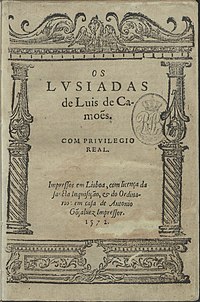Lusíadas

Front of the first edition of Os Lusíadas
|
|
| Author | Luís de Camões |
|---|---|
| Original title | Os Lusíadas |
| Translator | William Julius Mickle |
| Country | Portugal |
| Language | Portuguese |
| Genre | Epic poetry |
|
Publication date
|
1572 |
|
Published in English
|
1776 |
| Media type | |
Os Lusíadas (Portuguese pronunciation: [uʒ luˈzi.ɐðɐʃ]), usually translated as The Lusiads, is a Portuguese epic poem by Luís Vaz de Camões (sometimes anglicized as Camoëns). It is often regarded as the most important work of Portuguese literature, and is frequently compared to the Aeneid, Virgil's great epic poem. The work celebrates the discovery of a sea route to India by the Portuguese explorer Vasco da Gama (1469–1524). The 10 cantos of the poem are in ottava rima and total 1,102 stanzas.
Written in Homeric fashion, the poem focuses mainly on a fantastical interpretation of the Portuguese voyages of discovery during the 15th and 16th centuries. Os Lusíadas is often regarded as Portugal's national epic, much as Virgil's Aeneid was for the Ancient Romans, or Homer's Iliad and Odyssey for the Ancient Greeks. It was written when Camões was an exile in Macau and was first printed in 1572, three years after the author returned from the Indies.
The poem consists of ten cantos, each with a different number of stanzas (1102 in total). It is written in the decasyllabic ottava rima, which has the rhyme scheme ABABABCC, and contains a total of 8816 lines of verse.
...
Wikipedia
